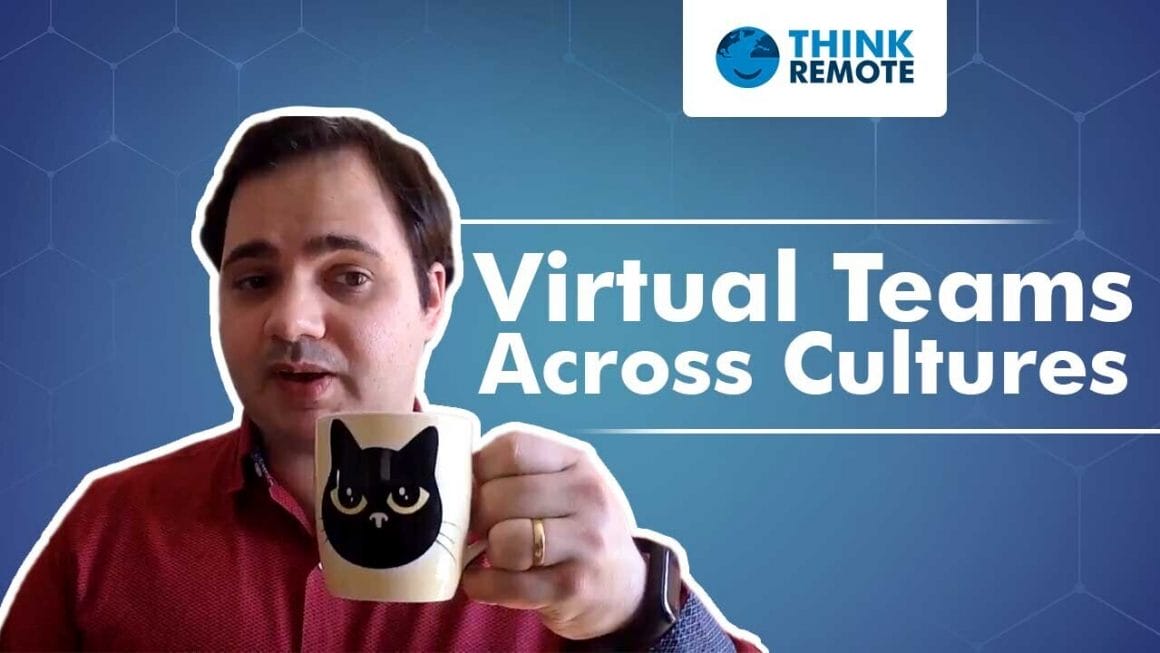On Day 4 of the Debts & Lessons Week, Luis thanks Theresa Sigillito Hollema and her book Virtual Teams Across Cultures: Create Successful Teams Around the World.
Book week was last week but Luis felt that it would be absolutely unfair to not include Theresa’s book as it has really helped Luis understand diversity a lot better than he did before. We talk of diversity and inclusiveness all the time but is your company really as diverse or inclusive as you think? Regardless of the ethnicities that you’re representing, it’s probably mostly people from the same country and maybe even from the same age bracket. Watch this video to learn what Luis gained from his conversation with Theresa Sigillito Hollema, a cultural consultant and an expert at team development and virtual teams.
Watch this space every day for the latest news, tips and stories from the remote work world!
Luis: Today on Virtual Coffee Chat with Luis. Let’s talk about virtual teams across cultures. Welcome to Virtual Coffee Chat. Let’s have a sip. This is Virtual Coffee Chats with Luis for ThinkRemote. And we are in the middle of that and lessons week where I shine a spotlight on some of the people that have influenced me the most as a remote work leader and their works. So actually last week we had book week and I’m going to cheat a little bit and do a bit of a crossover episode because this, that’s, and lessons episodes day four, actually has a book associated with it. Because today I am talking about Theresa Sigillito Hollema, who gave me this lovely book called Virtual Teams Across Cultures: Create Successful Teams Around the World.
And not only have I loved Theresa book and I felt Theresa’s book and I felt bad for not including it on book week, but only five videos on book week. So I have to choose five books and it was a hard choice. But I didn’t want to not to talk about Theresa’s book. Because look, it’s easy to talk about diversity, right? Diversity this, diversity that, inclusiveness this, inclusiveness that, blah, blah, blah, blah, blah, blah, blah. But hear me out probably your company, no matter how much you make an effort, isn’t as diverse or inclusive as you think. Because let’s face it, regardless of the ethnicities that you’re representing, it’s probably mostly people from the same country and maybe even from the same age bracket.
So what’s amazing about this book and what I took from my conversation with Theresa. Oh right. I should introduce her. So Theresa is basically a cultural consultant and an expert at team development and virtual teams. She focuses on leadership and organizational capacity in several areas, building cultural competence, developing high-performance teams and leading virtually. Right. And what I got from our conversation from a conversation with her, was something that I knew intuitively because I work at a company with people that are really actually spread all around the world from lots of different cultures from the Philippines to Canada. Right. I have people in the middle east. I have people in India, people in Eastern Europe, people in Brazil, people in Portugal, all around the place, all of these people, they have different cultures. And a lot of what we did successfully was really to find a common ground and a place where we really understood each other’s cultures.
And Theresa really helped me. Talking with Theresa really helped me formalize the ideas that I had about how to handle cross-cultural team members. I can proudly say that just on the marketing team alone that I lead at distant job, just on that marketing team, there’s like five different cultures represented. And this goes beyond what you’re thinking about. Let’s make sure we don’t do any jokes that are offensive to the person’s culture. We actually need to accept that different cultures come with different work ethics, with different ways to communicate especially across leadership boundaries, different ideas of how to communicate challenges, if it’s acceptable to communicate challenges or not, or when is it acceptable to do it, et cetera, et cetera.
And in your organization, people need to be on the same page. So you need to find a way to transition from personal culture to company culture. And this is just one of the many things that I’ve talked about with Theresa. And I really valued the feedback that she gave me, the inputs that she gave me. And of course, all of the contents that are in their book. She is also just a lovely, absolutely lovely person to interact with. So I recommend you look her up on LinkedIn and on Twitter. Her content is great. Her insights are incredible. Thank you so much, Theresa. I hope you’ll stop by for a coffee sometime. Your work has had a great impact on me. So again, thank you so much for that. And I hope that I’m sending some good karma. I’m hope I’m sending some good karma your way because you deserve it.
So, and you dear listeners slash viewer, you deserve to have the best news and the best content, the best insights about the world of remote work delivered to you. So I suggest that you head onto thinkremote.com and subscribe to our newsletter. It’s our launch month at ThinkRemote. So if you do so, you might get some nice prizes, some awards, there’s some swag that we’re going to give to newsletters subscribers. So head on to thinkremote.com. And if you enjoy this conversation, this small coffee chat, if you want to have coffee with me more times, please like, share, subscribe. That’s it. That’s Virtual Coffee Chat with Luis. See you tomorrow.






